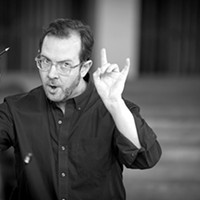Sure, he's one of the most virulent racists in the history of drama. And everyone would admit that he destroys a noble warrior whose paramount mistake was trusting his destroyer. But in Iago, playwright James McLure is willing to entertain the notion that Shakespeare's wickedest villain was misunderstood, driven by gnawing love rather than fiendish hate.
The whole notion has a delicious wickedness to it, which makes it seem like McLure will content himself in delivering a slick, witty, dishy amusement. We revisit Othello, but that isn't ultimately where the seriousness surfaces. No, our brush with the Bard occurs via an English production whose principals are thinly veiled replications of Laurence Olivier, Vivien Leigh and Peter Finch.
Leigh and Olivier are of course the power theater couple of 20th century England -- making Finch's affair with the silver screen's Scarlett O'Hara his most audacious exploit in cuckoldry. But it would be too simplistic to say that McLure's version of Finch is smitten by Leigh. As the action unfolded in this Moving Poets staged reading, Peter Finney (Finch) seemed to be stalking Vivacity Wilkes (Leigh) with the same predatory sangfroid he uses to capture the role of Iago in Anthony Roland's (Olivier's) production.
Once he lands the role, Finney flaunts his offstage liaison with Vivacity at a pub while his benefactor looks on from a nearby table. Then he brings it into the rehearsal hall. Iago, he maintains, isn't purely evil: He's driven by his lust for Desdemona.
Even that isn't outrageous enough for McLure. So Finney goes even further in unearthing new motivations for Iago -- planting a lover's kiss on Othello's face in a subsequent rehearsal, to Roland's absolute disgust. It's when Finney's playfulness results in the breakup of Tony and Vivacity's marriage that McLure's script turns serious in Act 2.
The production at Hart-Witzen's Theatre 36 was poignantly reminiscent of Charlotte Rep. Not only was this script-in-hand production on an Equity level, it featured Rep mainstay Randell Haynes in his first stage appearance since the company's demise. And it returned McLure to town for the first time since April 2003, when he brought a new script called Calvary to Rep's final New Play Festival.
Iago is more artfully crafted. With unerring instinct, McLure injects Sir Basil Drill -- quickly identifiable as Noel Coward -- into the midst of this Leigh/Finch/Olivier triangle. His presence buffers the confrontations that would likely flare in his absence, and his cool British wit provides a wry perspective on the roiling sexual tensions of the protagonists.
"I was in love once," he sniffs. "Worst afternoon of my life."
In the course of directing this star-crossed Othello, Basil becomes the confidante of all three embattled artists. The role fits Haynes like a glove, and the fact that he also directed this Moving Poets production added another layer of irony. Like why shouldn't he empathize with them -- he cast them in their roles!
Scott Helm was superb as the earnest, sociopathic Finney, and Jerry Colbert was an ideal foil, passionate and vulnerable as Tony with a thick coating of theatrical conceit. In her Charlotte debut, Monica Bell captured Vivacity's frailties as effortlessly as her fading beauty.
For all their fame, talent and ego, we come to believe that all the combatants in Iago are helpless in the thrall of love. That may not have been what drove Shakespeare's arch-fiend on his destructive path, but it makes sympathetic victims of all McLure's glittery stars.
Should a TV writer be considered for the Nobel Prize in Literature? Exhibit A for the candidacy of Aaron Sorkin would obviously be The West Wing, the celebrated network series. You can also view Sorkin's stage credentials in the Carolina Actors Studio Theatre production of A Few Good Men -- if you manage to wend your way around the mammoth oak that fell on the C.A.S.T. parking lot during last Friday's performance.
Sorkin's preoccupation with the burdens of upholding and defending democracy go back to this 1992 script, which transports us to Guantanamo Naval Base. Gitmo's still a harbor for corruption and controversy. Dicey stuff has been going on with the detainees at Guantanamo since 9/11, but we're also reminded of Abu Ghraib by top brass's arrogance and disregard for decency.
Because so much of the high drama of A Few Good Men occurs in a courtroom, Sorkin's deep ambivalence toward the military is more sharply etched than it is on TV. He defends and assails the martinets who risk their lives to guard our liberties, and he's equally even-handed with the liberal desk jockeys who presume to second-guess their protectors.
The balance is exquisitely dialectic. Why do you hate them so much? asks Lt. Commander Joanne Galloway of Lt. Weinberg, the lawyer who reluctantly tags along to Cuba in the wake of a suspiciously tidy murder of a troublemaking Latino private. Why do you love them so much? asks our hero, Lt. Daniel Kaffee, after trying to save the skins of two rigid Marine defendants who refuse to cooperate.
Weinberg and Galloway's answers are as good as the questions. But what truly elevates A Few Good Men is the story of Kaffee, maturing under fire as a man and an attorney. John Horton isn't up to the full range and force of the role, but he conveys the developmental arc reasonably well.
The supporting cast is as solid as director Robert Tolan's detailing. Bryan Forrest burns with the fiery zeal of Lt. Colonel Kendrick, the defendants' superior officer, and Scott Reynolds is aglow with the arrogance of base commander Colonel Jessup, the notorious megalomaniac who tells Kaffee famously, "You can't handle the truth."
Of course, we know by now that he can. Watching the cocky slacker grow up is still a powerful payoff after three hours of gripping, pertinent drama.
Charlotte Symphony began their 2005-06 season auspiciously with Tai Murray and Nokuthula Ngwenyama partnering, on violin and viola, as soloists in Mozart's Sinfonia concertante. But the ensemble, under Christof Perick's baton, let us know even earlier that this year's CSO will be reaching higher levels of refinement.
Every pastoral coloration of Otto Nicolai's "Overture to The Merry Wives of Windsor" was present in the breezy opening. Nor did the sharpness of the orchestra evaporate when the overture released into a romping finale with dynamic shifts worthy of Rossini. Listening for progress from the orchestra, however, I was most impressed by the orchestral segments of Mendelssohn's "Incidental Music to A Midsummer Night's Dream."
In the past, the CSO have played their tutti with more exuberance than clarity. When brass and strings massed together in a fortissimo, the thunderclaps at Belk Theater tended to be muddy and murky. Now they're playing the hall as if they own it.
Latest in Performing Arts
More by Perry Tannenbaum
Calendar
-
An Evening With Phil Rosenthal Of "Somebody Feed Phil" @ Knight Theater
-
Kountry Wayne: The King Of Hearts Tour @ Ovens Auditorium
-

NEW WINDOW GALLERY-Pat Rhea-ACRYLIC PAINTINGS-April 05-30 2024 VALDESE, NC 28690 @ New Window Gallery/Play It Again Records
- Through April 30, 12 p.m.
-

The Comic Strip (Comedy + Sip & Paint) @ Superstarz
-

Uptown Area: R&B Sip & Paint @ Superstarz
-
Holiday Gift Guide
26 ways to shop local this holiday season
-
Charlotte Film Festival Features Distinct and Different Voices
Diversity and discovery hit the big screen
-
Fall Guide: Upcoming festivals, comedy shows, visual arts events and more














